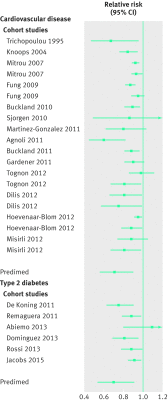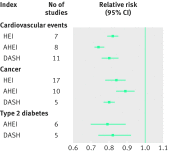Food based dietary patterns and chronic disease prevention
- PMID: 29898951
- PMCID: PMC5996879
- DOI: 10.1136/bmj.k2396
Food based dietary patterns and chronic disease prevention
Abstract
Matthias B Schulze and colleagues discuss current knowledge on the associations between dietary patterns and cancer, coronary heart disease, stroke, and type 2 diabetes, focusing on areas of uncertainty and future research directions
Conflict of interest statement
Competing interests: We have read and understood BMJ policy on declaration of interests and declare the following: MBS receives funding from the German Federal Ministry of Education and Research (FKZ: 01EA1408A-G). MAM-G has no conflict of interest and has received funding from public agencies, including the European Research Council (Advanced Research Grant, #340918) and from Instituto de Salud Carlos III, CIBEROBN. TTF has nothing to declare. AHL receives funding from the US National Institutes of Health, US Department of Agriculture and the Hass Avocado Board. NGF receives funding from the Medical Research Council Epidemiology Unit (MC_UU_12015/5). She is a member (unpaid) of the Joint SACN/NHS-England/Diabetes-UK Working Group to review the evidence on lower carbohydrate diets compared with current government advice for adults with type 2 diabetes and is a member (unpaid) of ILSI-Europe Qualitative Fat Intake Task Force Expert Group on update on health effects of different saturated fats.
Figures


References
-
- US News. Best diets. http://health.usnews.com/best-diet.
-
- United States Department of Agriculture. A series of systematic reviews on the relationship between dietary patterns and health outcomes, 2014. https://www.cnpp.usda.gov/nutrition-evidence-library-dietary-patterns-sy....
Publication types
MeSH terms
Grants and funding
LinkOut - more resources
Full Text Sources
Other Literature Sources
Medical
